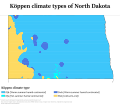
Back Portal:Dakota del Norte Spanish Portail:Dakota du Nord French Portal:Dakota do Norte Portuguese
The North Dakota Portal North Dakota ( /dəˈkoʊtə/ ⓘ də-KOH-tə) is a landlocked U.S. state in the Upper Midwest, named after the indigenous Dakota Sioux. It is bordered by the Canadian provinces of Saskatchewan and Manitoba to the north and by the U.S. states of Minnesota to the east, South Dakota to the south, and Montana to the west. North Dakota is part of the Great Plains region, characterized by broad prairies, steppe, temperate savanna, badlands, and farmland. North Dakota is the 19th-largest state by area, but with a population of just under 800,000, it is the fourth-least populous and fourth-most sparsely populated. The state capital is Bismarck while the most populous city is Fargo, which accounts for nearly a fifth of the state's population; both cities are among the fastest-growing in the U.S., although half of all residents live in rural areas. What is now North Dakota was inhabited for thousands of years by various Native American tribes, including the Mandan, Hidatsa, and Arikara along the Missouri River; the Ojibwe and Cree in the northeast; and several Sioux groups (the Nakota, Dakota, and Lakota) across the rest of the state. European explorers and traders first arrived in the early 18th century, mostly in pursuit of lucrative furs. The United States acquired the region in the early 19th century, gradually settling it amid growing resistance by increasingly displaced natives. The Dakota Territory, established in 1861, became central to American pioneers, with the Homestead Act of 1862 precipitating significant population growth and development. The traditional fur trade declined in favor of farming, particularly of wheat. The subsequent Dakota Boom from 1878 to 1886 saw giant farms stretched across the rolling prairies, with the territory becoming a regional economic power. The Northern Pacific and Great Northern railway companies competed for access to lucrative grain centers; farmers banded together in political and socioeconomic alliances that were core to the broader Populist Movement of the Midwest. North and South Dakota were admitted to the Union on November 2, 1889, as the 39th and 40th states. President Benjamin Harrison shuffled the statehood papers before signing them so that no one could tell which became a state first; consequently, the two states are officially numbered in alphabetical order. Statehood marked the gradual winding-down of the pioneer period, with the state fully settled by around 1920. Subsequent decades saw a rise in radical agrarian movements and economic cooperatives, of which one legacy is the Bank of North Dakota, the only state-run bank in the U.S. (Full article...) Selected article -Lawrence Welk (March 11, 1903 – May 17, 1992) was an American accordionist, bandleader, and television impresario, who hosted The Lawrence Welk Show from 1951 to 1982. The program was known for its light and family-friendly style, and the easy listening music featured became known as "champagne music" to his radio, television, and live-performance audiences. Welk, a native of North Dakota who was born to German immigrants from Russia, began his career as a bandleader in the 1920s in the Great Plains. He gradually became more known throughout the country due to recordings and radio performances, and he and his orchestra were based in Chicago in the 1940s, where they had a standing residency at the Trianon Ballroom. By the start of the next decade, Welk relocated to Los Angeles and began hosting his eponymous television show, first on local television, before going national when the show was picked up by ABC in 1955. The show's popularity held through the following years, and with its focus on inoffensive entertainment, it was embraced by conservative audiences as an antidote to the counterculture of the 1960s. Welk vigorously sought to uphold this "clean-cut" reputation, and was deeply involved in managing both the on- and off-camera reputations of his show's performers. (Full article...) CategoriesGeneral images -The following are images from various North Dakota-related articles on Wikipedia.
Did you know -
TopicsLargest cities
Recognized content
|
- ^ "City and Town Population Totals: 2010-2019". United States Census Bureau. Retrieved May 28, 2020.
- ^ "2010 Census Redistricting Data (Public Law 94-171) Summary File". American FactFinder2. U.S. Census Bureau, 2010 Census. Retrieved October 26, 2012.[dead link]






















